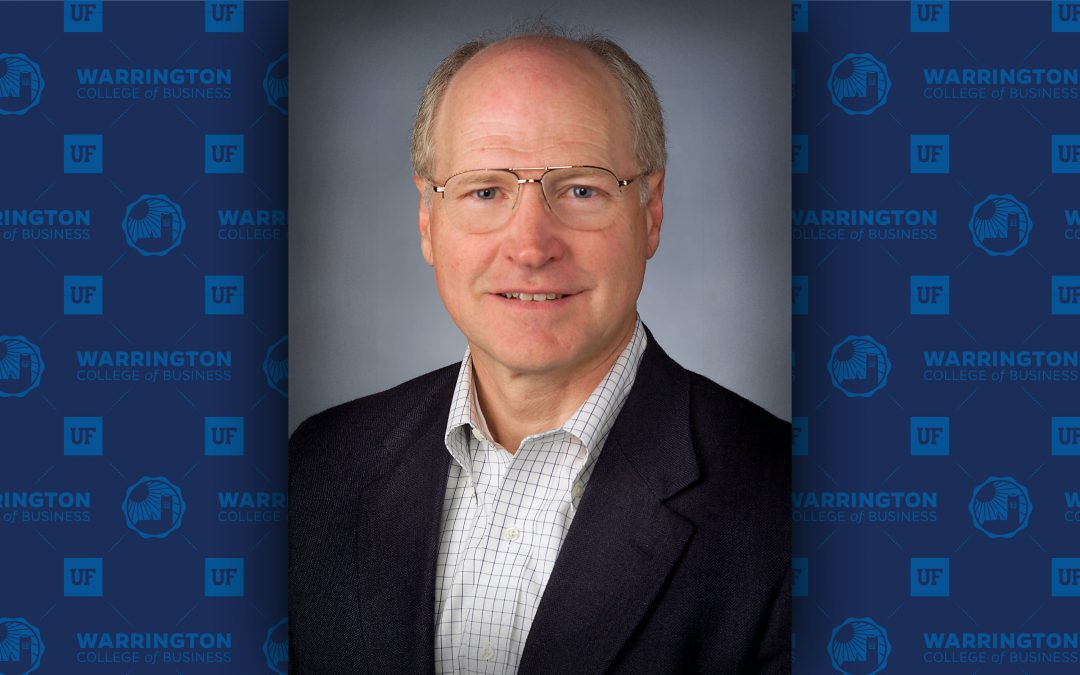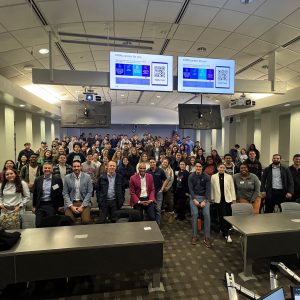How much do you know of what there is to know?
Bruce Hawthorne (DBA ’22) went for his doctorate in business administration out of curiosity.
After a full career practicing law in a large firm and C-suite roles at three big companies, Hawthorne decided his next phase would be diving into the academic side of issues he’d faced as a practitioner. He entered the Doctor of Business Administration (DBA) program at the University of Florida Warrington College of Business with an interest in why scholars and business leaders don’t interact very much – a phenomena he noticed during C-suite meetings with his former colleagues.
“Companies will solve their problems, but they don’t regularly make use of academia,” he explained. “You’d think it’d be natural to reach into the scholarship, otherwise you have to reinvent it yourself.”
Many of the problems businesses face aren’t new; companies have been dealing with them for decades, and scholars have been studying them for just as long. Making use of academic research means executive teams should be able to reach proven solutions faster. But with so much information to sift through, how can they do so without the help of those who stay on top of the ever-evolving scholarly library? Hawthorne’s career experience helped guide him toward an answer.
Hawthorne says that as a practitioner he embraced a philosophy that leadership is about getting others to want to do what you need them to do, and found that by combining the principles of empowerment, transparency and information availability he could achieve superior solutions. He also regularly spoke to practitioners on these issues and came to view his approach as a form of inclusive leadership.
The UF DBA program provided Hawthorne with the opportunity to help close the gap between business leaders and scholars, meeting his expectation that scholars would be well-familiar with the approaches that had served him so well as a practitioner. By joining the academic side he was able to use his newly developed skills to observe how scholars had developed corresponding solutions.
This approach guided Hawthorne’s research as a doctoral student, and he quickly recognized that several leadership literatures provided support and explanations for his leadership philosophy, while other literatures explored and confirmed the role of empowerment and transparency as predictors of workplace outcomes. On the other hand, while he found that information was an often-discussed topic across literatures, there wasn’t much research exploring the relationship between peoples’ information availability and their workplace outcomes. This provided the principal research motivation that has guided Hawthorne for the last several years.
Hawthorne says his research began by pulling together strands of research that he found in multiple literatures that had evolved separately from each other, but explored the role of information availability as a driver of workplace outcomes in different contexts. This inspired the thought that each of these foundational literatures were really looking at the same underlying variable and led Hawthorne to propose a new theory of contextual information availability in his dissertation – including a new measurement construct – which explains that variability in the information available to people in their work situations is an important predictor of their workplace outcomes. The dissertation begins: “To understand why people do the things they do it is important to examine the extent to which they know, or think they know, what there is to know.”
Hawthorne has continued his research as a visiting scholar at UF and has two articles in the publication process. The first is a paper entitled “Re-exploring the Antecedents of Proactivity at Work” and was published earlier this month in the Management Review Quarterly. Among other things, it reports evidence that contextual information availability is an antecedent of proactivity and offers a comprehensive proactivity model that updates prior research. The second paper is in its second stage of peer review at the Journal of Trust Research and reports a study of the relationships between peoples’ contextual information availability and their co-worker trust outcomes.
Taking 50 years of career experience with him into the DBA program equipped Hawthorne to immediately dive into information sharing and other topics that had interested him for decades. It also enabled him to be a unique contributor in his cohort. Hawthorne has witnessed all that has changed in business since earning his MBA and juris doctorate in the 70s, including the technology available to business students. In his day, computers and handheld calculators weren’t available at universities, restricting him to instruments like sliderules – several of which are on display in the Fisher School of Accounting’s museum. When a faculty member pointed this out to Hawthorne, they shared a good laugh.
“Interacting both with faculty and colleagues in the cohort was wonderful,” he said. “People at UF have given me a whole new bag of tools and given me the credibility to share [my] ideas in the world of academic literature.”




